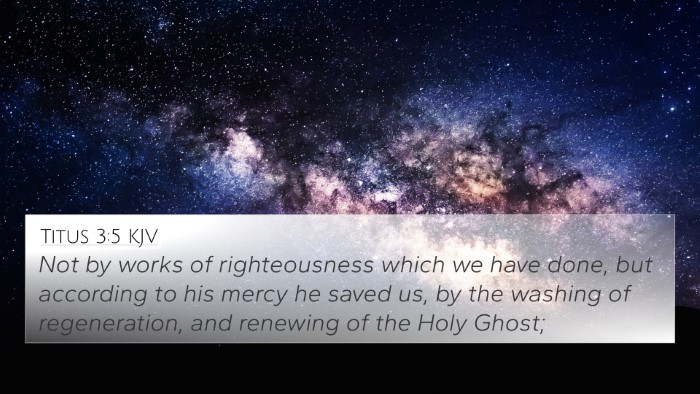Ephesians 2:5 - Verse Meaning Summary
Ephesians 2:5 states: “Even when we were dead in sins, hath quickened us together with Christ, (by grace ye are saved;)” This verse encapsulates the essence of Christian salvation, emphasizing God's grace and the transformative power of Christ in the lives of believers.
Significance of 'Quickened'
The term 'quickened' implies being made alive. According to Matthew Henry, God's divine intervention revives those spiritually dead due to sin. Albert Barnes supports this by stating that spiritual resurrection is essential for believers, highlighting that without this quickening, one cannot partake in the redemptive life offered through Christ. Adam Clarke expands this view by noting that this process ushers believers into a new existence, showcasing a radical transformation from death to life.
The Role of Grace
This verse underlines the importance of God's grace. Matthew Henry explains grace as unmerited favor — we receive life through Christ not because we deserve it but simply due to God's loving kindness. Albert Barnes reaffirms this point by detailing how grace is the means through which believers experience salvation, emphasizing that it's a gift that cannot be earned. Adam Clarke notes that this saving grace initiates a relationship between the believer and Christ, fundamentally changing their identity and purpose.
Cross-References
- Romans 5:8 - "But God commendeth his love toward us, in that, while we were yet sinners, Christ died for us."
- Colossians 2:13 - "And you, being dead in your sins and the uncircumcision of your flesh, hath he quickened together with him, having forgiven you all trespasses."
- John 5:24 - "Verily, verily, I say unto you, He that heareth my word, and believeth on him that sent me, hath everlasting life, and shall not come into condemnation; but is passed from death unto life."
- Titus 3:5 - "Not by works of righteousness which we have done, but according to his mercy he saved us, by the washing of regeneration, and renewing of the Holy Ghost."
- 2 Corinthians 5:17 - "Therefore if any man be in Christ, he is a new creature: old things are passed away; behold, all things are become new."
- 1 Peter 1:3 - "Blessed be the God and Father of our Lord Jesus Christ, which according to his abundant mercy hath begotten us again unto a lively hope by the resurrection of Jesus Christ from the dead."
- Romans 8:11 - "But if the Spirit of him that raised up Jesus from the dead dwell in you, he that raised up Christ from the dead shall also quicken your mortal bodies by his Spirit that dwelleth in you."
Links to Other Biblical Themes
Understanding Ephesians 2:5 leads to a deeper appreciation of several thematic connections across Scripture:
- Salvation by Grace - This theme is prominent in both the Old and New Testament, emphasizing God's unearned favor.
- Spiritual Resurrection - Illustrated in multiple verses, this indicates the transformation from spiritual death to life.
- God's Love and Mercy - This is integral to understanding the nature of salvation as seen in Ephesians 2:5, paralleling the sentiments expressed in Romans 5:8 and Titus 3:5.
How Ephesians 2:5 Fits into the Larger Narrative
This verse serves as a significant pivot in Paul’s epistle, showcasing the transition from discussing the depravity of man to the divinity of Christ's redemptive work. It invites believers into a journey of understanding how their past entangled in sin is transformed through acceptance of Christ's sacrifice, reinforcing the interconnectedness of the Pauline epistles.
Conclusion
The essence of Ephesians 2:5 not only highlights the act of divine grace but also prompts believers to reflect on their personal transformation through faith in Christ. The interplay of spiritual life and grace is central to Christian doctrine, making this verse a crucial point of study for believers seeking a deeper understanding of their faith.
Further Study and Reflection
For those interested in delving deeper into the connections between Bible verses, utilizing Bible cross-reference resources can be invaluable. Tools like concordances and Bible reference guides assist in discovering similar themes and teachings throughout Scripture, enriching one's study and comprehension of the intricacies contained within biblical texts.




















